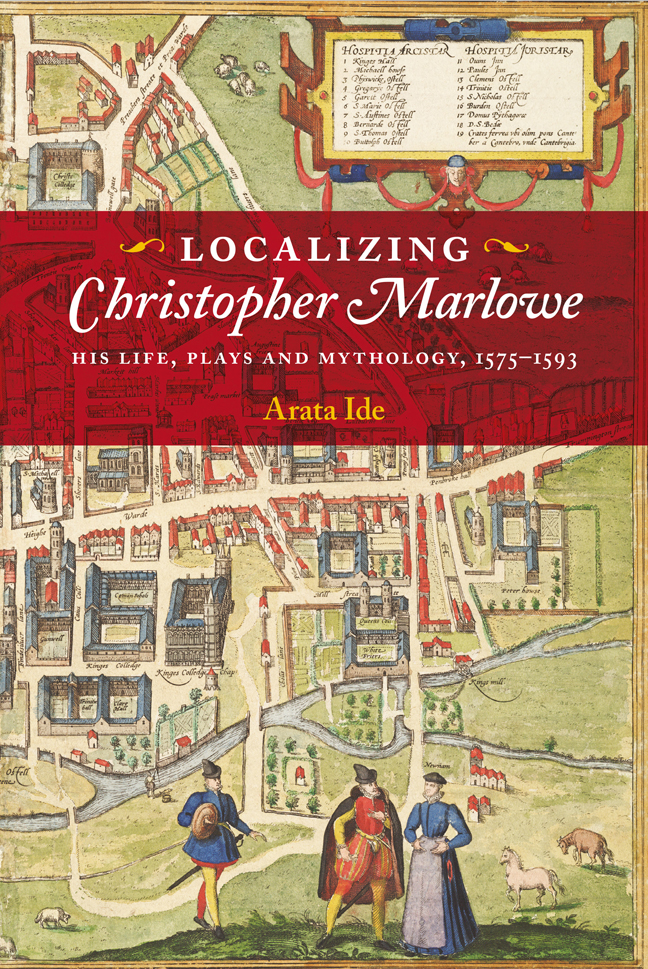Book contents
- Frontmatter
- Dedication
- Contents
- List of Illustrations
- Acknowledgements
- List of Abbreviations
- Timeline
- Note for the Reader
- Introduction
- Part I Life
- Part II Plays
- Part III Myths
- Conclusion
- Appendix 1 Transcript of the plan in Norfolk Record Office, NRS 23372, Z99
- Appendix 2 Transcript of the plan in Corpus Christi College Archives, CCCC08/28
- Appendix 3 Transcript and translation of the John Marley vs Nevell Hayes case
- Appendix 4 List of Foundation Scholars of Corpus Christi College, 1573–87
- Bibliography
- Index
- Miscellaneous Endmatter
3 - The Origin of the Rumour against Marlowe
Published online by Cambridge University Press: 22 February 2024
- Frontmatter
- Dedication
- Contents
- List of Illustrations
- Acknowledgements
- List of Abbreviations
- Timeline
- Note for the Reader
- Introduction
- Part I Life
- Part II Plays
- Part III Myths
- Conclusion
- Appendix 1 Transcript of the plan in Norfolk Record Office, NRS 23372, Z99
- Appendix 2 Transcript of the plan in Corpus Christi College Archives, CCCC08/28
- Appendix 3 Transcript and translation of the John Marley vs Nevell Hayes case
- Appendix 4 List of Foundation Scholars of Corpus Christi College, 1573–87
- Bibliography
- Index
- Miscellaneous Endmatter
Summary
Soon after the time of William Austen's financial trouble with Richard Gee, a rumour about Marlowe spread through Corpus Christi College. Because of this rumour, it was proposed that Marlowe be denied his Master's degree. In June, however, he obtained full support from the Privy Council. The certificate is not extant, but there is a summary in the Privy Council Register on 29 June 1587, in which the members of the council addressed the authorities of Cambridge University, stating that
Whereas it was reported that Christopher Morley was determined to haue gone beyond the seas to Reames and there to remaine, Their L[ord-ship] s thought good to certefie that he had no such intent, but that in all his acc[i]ons he had behaued him selfe orderlie and discreetelie wherebie he had done her Ma[jes]tie good service, and deserued to be rewarded for his faithfull dealinge: Their L[ordship]s request was that the rumor thereof should be allaied by all possible meanes, and that he should be furthered in the degree he was to take this next Commencem[en]t: Because it was not her Ma[jes]tes pleasure that anie one emploied as he had been in matt[e]rs touching the benefitt of his Countrie should be defamed by those that are ignorant in th’affaires he went about.
There is nothing to be gained here from discussing the credibility of ‘the rumor’ itself. The source is also of little importance, for it is almost impossible to identify the originator of a rumour or an urban legend even in modern times. Rather, as the sociologist Jean-Noël Kapferer points out, ‘What must be explained in the genesis of a rumor process is the group's adherence and mobilization. Even if there is an initial speaker, it is the other people who found the rumor for, having heard it, they pass it on’. What is of greatest significance about the Privy Council certificate is, therefore, not whether the rumour was true or who started it, but who tended to believe it and to pass it on. In this case, the certificate implies the involvement of a hostile person or group in approving and circulating the report which ‘defamed’ Marlowe and identified him as a convert to Catholicism.
It is not unusual to come across defamation cases in the records of the vice-chancellor's court at Cambridge.
- Type
- Chapter
- Information
- Localizing Christopher MarloweHis Life, Plays and Mythology, 1575-1593, pp. 89 - 113Publisher: Boydell & BrewerPrint publication year: 2023

